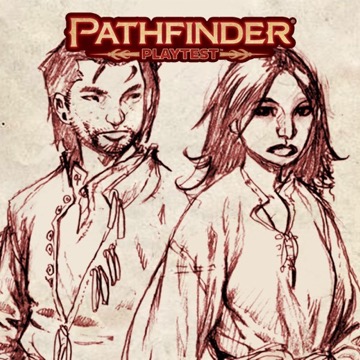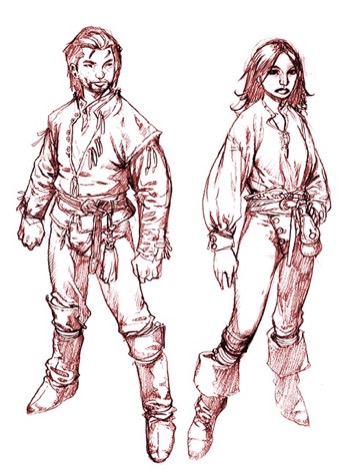Hey, everybody! It's our first design blog after PaizoCon! It was great getting a chance to show the game off for the attendees there and collect your comments after your first chance to play. But what if we looked at something there wasn't a chance to demo at the convention?
We've mentioned before that we're more clearly defining the three modes of play for the Pathfinder Playtest. Encounter, exploration, and downtime mode all have a place in the game, and they each play out differently at the table. So, let's look at the robust new systems we've built to cover what your characters do when they're not out on adventures!
Downtime mode is measured in days and gives you a chance to enact your long-term plans. You might craft items, heal up, conduct rituals, retrain some of your character options to choose other ones, or work at jobs or stage performances to make money. These are all things that take time and can't really be done in the middle of a dungeon.
Of course, just like with the other modes of play, these are all things you could do previously in Pathfinder. The difference in the Playtest is that we've more clearly defined these tasks in terms of what you can complete in the number of days you commit to them. This means if the GM wants to codify how long things take, it's more obvious what the value of a day spent at a task is.
Activities
When you have a day or more off, you can choose a defined downtime activity (or decide to do whatever else you want to). A few of these are general, like taking bed rest to heal more quickly or retraining your feats, skill choices, and selectable class features.
Most of downtime activities, however, appear under skills and require skill checks. The ones appearing in the Pathfinder Playtest Rulebook are Craft, Create Forgery, Gather Information, Practice a Trade, Stage a Performance, Subsist on the Streets, Survive in the Wild, and Treat Disease. All of these require a skill check to determine how successful you are, and a few are explained in more detail later in this blog.
We also know we'll have some downtime activities that are beyond the scope of the systems in the Playtest Rulebook. Building a keep or wizard's tower is one of the big ones. While we for sure want you to be able to establish a home base, this requires interconnectedness between other systems and a high level of work by the GM, so for the Playtest, we wanted to keep the focus on the more directly player-oriented downtime activities.
Making Money
Practicing a Trade and Staging a Performance use Lore skills or the Performance skill, respectively, to make money and potentially draw the attention of employers or patrons. For these activities, the GM determines what type of work or audience you can find and assigns it a level, using the same scale as PC levels. This sets your DC and how much money you can make, with more money coming in based on your proficiency rank. If you're in a small town and you're higher level, you might not find the type of sophisticated work that makes full use of your talents. If you're adventuring in the Shackles, maybe you can find work as a master of Sailing Lore that you wouldn't be able to find in, say, the Hold of Belkzen.
Because downtime can include a really large number of days, performing these activities long-term requires rolls only for interesting events; you can continue doing the job and earning money at a steady rate until the job is completed or your audiences run out. This means you can cover long periods of downtime quickly and embellish your activity with interesting details, rather than getting bogged down with 30 rolls for a month of downtime.
Crafting
One of the parts of downtime we know will be important to people is crafting items, including magical and alchemical ones. We knew that we didn't want item crafting to be as powerful in the new edition as it was in the first edition, where it was simply too easy to end up with far more powerful characters that had twice as much wealth, and in a way that didn't make a whole lot of sense in the game world.
In the Playtest, items have levels. You can craft items of your level or lower, and you must be skilled enough at crafting, reflected in your proficiency rank, to craft an item of that quality (trained for standard items, and expert, master, or legendary for higher-quality ones). Crafting an item requires you to spend half its Price in crafting materials. You might find or acquire these sorts of materials, and most of them you can buy directly with currency, if you need to.
You have to spend at least 4 days crafting an item of your level, and you can reduce this if your level is higher than the item's. Once that time is up, you have two options if you succeed at your check: complete the item right away by supplying the rest of its Price in materials (a great option if you have the money for the item but can't find one on the market), or spend more time on your crafting to reduce the Price through your superior skill. You can stop crafting at any time and complete the item by providing the remaining amount of its Price. If you got a critical success on your skill check, the discount is better!
What does this mean for characters who are looking to make money by crafting? Well, crafting progress is based on a similar scale to Practicing a Trade or Staging a Performance, so it's about as lucrative. In fact, if you want to work as a crafter for cash instead of items, you can use the same rules for Practice a Trade, but using your Crafting skill modifier instead! You might make most of your money crafting and selling minor items in a process taken from the normal rules, but you might also get the occasional special commission from a client who wants a specific item and is willing to pay top... gold piece.
Using Downtime in Your Game
If you're a Game Master, downtime lets you pace out your game and show the passage of time between adventures. Characters and their circumstances can change in tangible ways during their downtime. Adding color and storylines to downtime, as well as recurring characters, helps the PCs form bonds and feel they're more a part of the world around them. It also means that PCs with long-term goals have a clear way of attaining them, with a clearer structure than the game had before. Less guesswork for you, and immense expandability!
So how are your characters going to spend their downtime?
Logan Bonner
Designer










